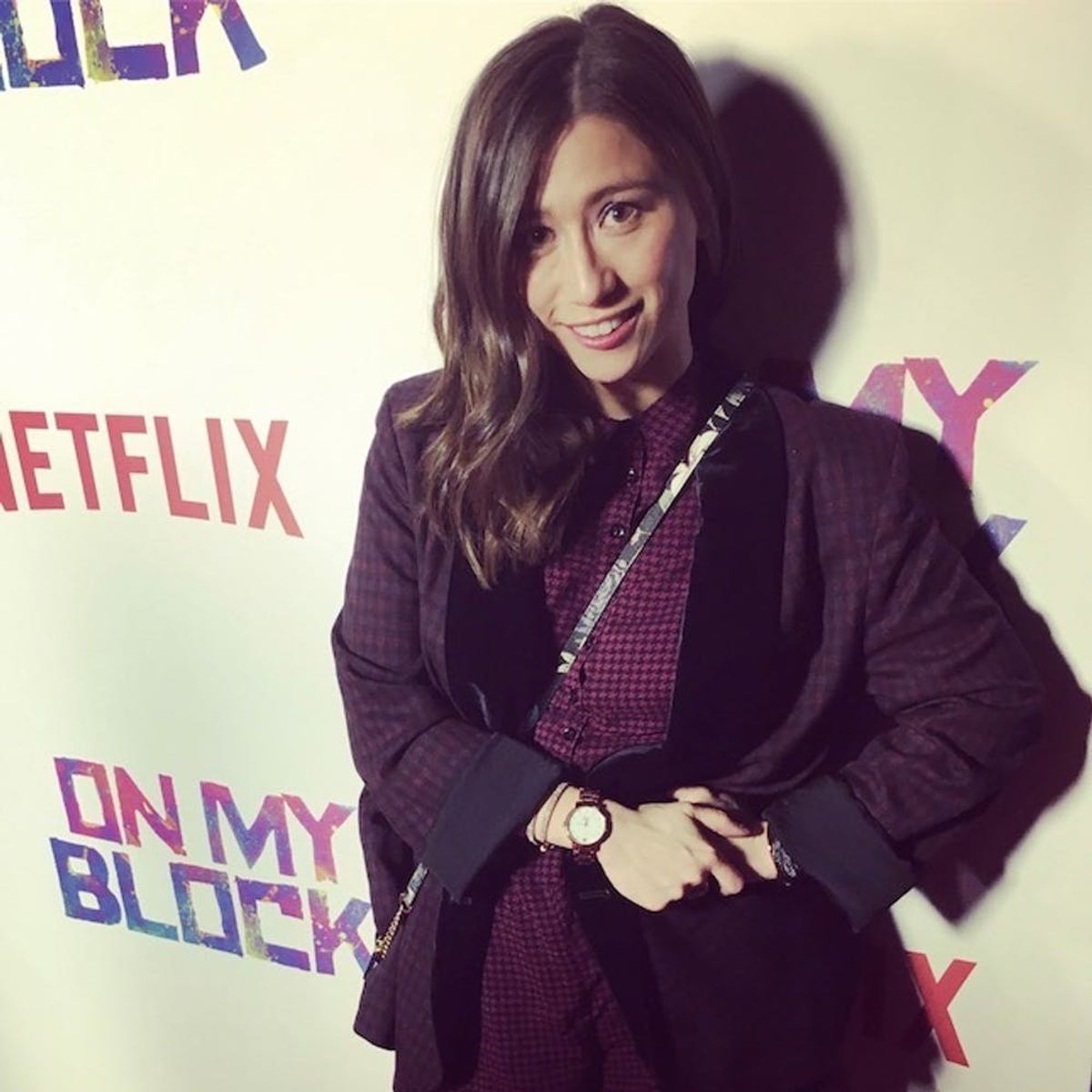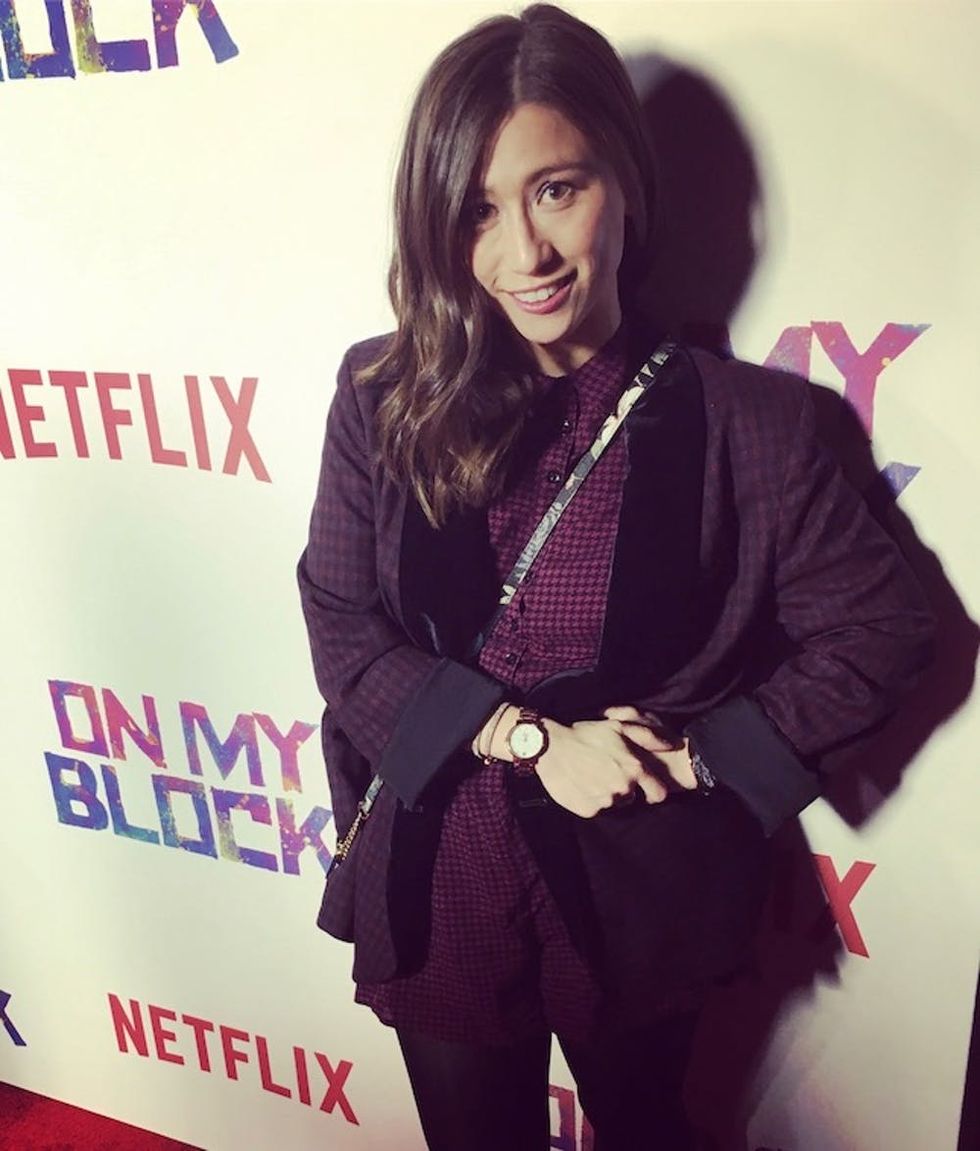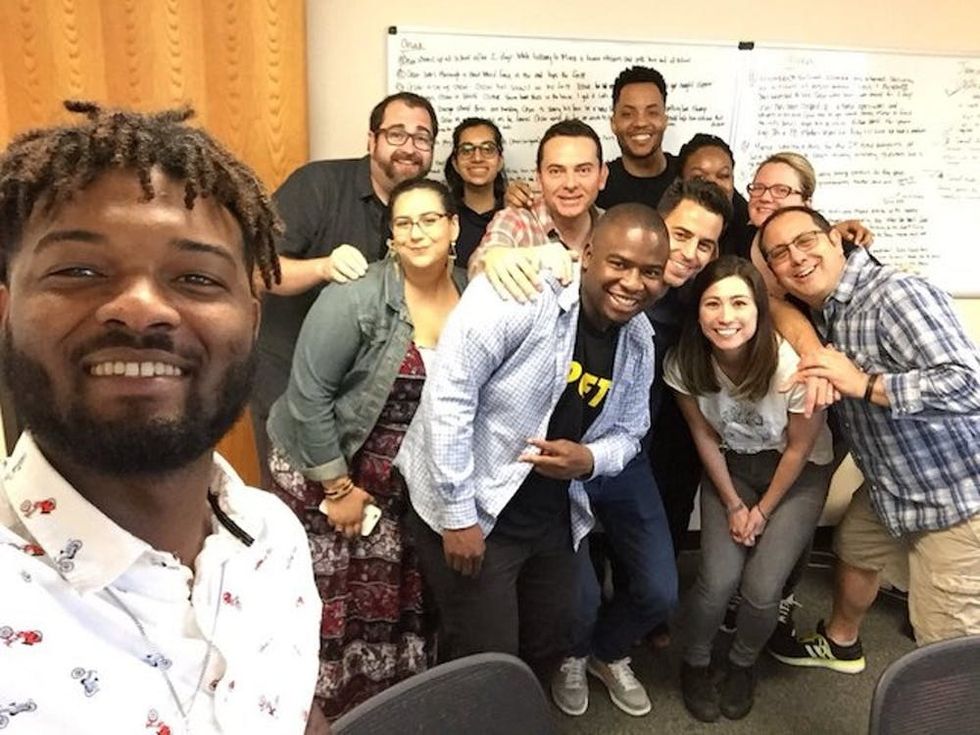A Story Editor on What It’s Like Inside Netflix’s ‘On My Block’ Writers’ Room

The popularity of Netflix’s 13 Reasons Why and the teen gay love story Love, Simon are leading the way for more young adult stories to hit the big and small screens (check out these teen-centric shows if you crave more). This summer, you can soak up all the rom-com feels during Netflix’s Summer of Love lineup, including the coming-of-age Netflix original show On My Block. The Los Angeles-based series details the lives of a diverse group of teenagers just starting high school and learning how to trust their squad. Jamie Uyeshiro, a story editor for On My Block, enrolled in a UCLA program for screenwriting and TV, and landed a manager after the program was over. Uyeshiro, who spent years as an assistant before breaking into the business, shares her journey from aspiring writer to paid staff writer in our Women in TV series, a collection of interviews with female producers, writers, and crew members who prove that being in the entertainment industry isn’t just for boys.
Meet the TV writer pro: Jamie Uyeshiro

Brit + Co: For people who don’t work in the entertainment industry, could you explain your title and responsibilities?
Jamie Uyeshiro: My most recent title was story editor, which is a little misleading because I’m not actually editing anything. It’s just a bump above staff writer, but in my experience, the duties are pretty much the same as all the other writers in the room. You pitch ideas, help to break the story, and usually get to write at least one episode. I’ve heard in some other rooms there is a clear hierarchy of titles and the lower-level writers don’t get to talk as much as the senior writers, but this hasn’t been the case in any of the rooms I’ve worked in. Everyone was able to be heard, regardless of title.

B+C: What does your typical workday look like?
JU: The day really depends on where we are in the process. If we’re still brainstorming episode ideas or breaking the story (plotting out the scenes for an episode) then we’re in the room together all day. We usually get in around 10am and spend a good chunk of the morning talking about things that have nothing to do with work and deciding what to order for lunch. After that, we get to work. The writers’ assistant tracks all the ideas as we talk them through, then when we feel like we have a good understanding of what will happen in an episode, we’ll write out all of the scenes in order on a dry-erase white board. Once an episode is broken, the showrunner will assign it to a writer. Then you’ll use those plot points as a guideline to write your outline and elaborate on what will happen in each scene. The showrunner and network will read it and give you any notes they have, then you’re off to draft.
I’ve worked on four shows so far and on each one, we’ve been able to write from home, which is ideal for me since I like to read the dialogue out loud and I feel like less of a crazy person talking to myself if I’m in the privacy of my own home. Typically, you get a week to write a draft. On those days, I spend a good amount of time procrastinating, doing house chores, and taking my dog on too many walks before I actually start writing. When I do get going, most of the time I’ll end up staying up half the night. I think I write better at night. Then, I’ll wake up early and start the whole process over again. I’ve found my brain doesn’t really let me sleep when I have to get a draft out. So by the time I finish I’m usually pretty sleep deprived, maybe even a little bit loopy.
Once the draft is done, the room meets back up to punch it up with jokes. The script goes up on a TV screen and all of the writers sit around pitching jokes as we scroll through or anything else we can think of to make it better. After the room wraps, sometimes the showrunner will invite you to set when they film your episode. I always go when I’m able to because I feel like watching the actors perform helps to inform the writing, and I’m also really interested in learning as much about the entire process, start to finish.
View this post on InstagramA post shared by On My Block (@onmyblocknetflix) on
B+C: What is one of your favorite things about working on On My Block?
JU: All the people I work with, throughout the entire process, but especially in the writers’ room. It was a relatively small group of us, but we all just seemed to really click. The room had a very collaborative, supportive feel and, working with super talented people, in that kind of an environment, I think is really all you could ask for in a creative setting. It allows you to feel like you can pitch whatever and regardless of if it takes or not, you’re not going to end up weeping on your commute home. From day one, the show creators, Lauren Iungerich, Eddie Gonzalez, and Jeremy Haft, made it clear to us it wasn’t just their show, it was all of ours. They wanted us to have a sense of ownership, and I think that’s something we all took to heart and it allowed us to be completely invested from the get-go.

B+C: How did you land your first TV gig?
JU: My first gig was on an MTV show, Mary + Jane. My manager and agent set up a meeting with the showrunners. At that point, I already had representation, which in my experience was the most challenging part of breaking in. It’s really hard to get your material in front of the right people. I caught my break when I did UCLA’s professional program for TV and screenwriting and one of my professors, who is a working TV writer, passed one of my scripts to his manager, who liked it enough to bring me in for a meeting and ended up signing me. When I started going out for meetings, I met a Comedy Central executive who recommended I get an agent, and my manager set up a few different meetings for me. Even with an agent and a manager, it’s hard to get your foot in the door, but I have heard of several people who started the other way around and got a gig before they ever signed with an agency.
View this post on Instagram#onmyblock #strongblacklead #sierracapri #monsefinnie #brettgray #jamalturner
A post shared by On My Block (@onmyblocknetflix) on
B+C: What is something that people don’t know about your work that you wish that they did?
JU: Sometimes it takes me a minute to open up to people, so when I first meet someone I can seem a bit more reserved than I actually am. I’m usually the person in the room with the story that takes it too far, sometimes oversharing. But I don’t think that part of me always comes across right away.
B+C: What do you love about working in TV?
JU: Everything. Which seems like a generic answer, but seriously. I’ve had a lot of other jobs. I’ve been an assistant 10 times over: for a lawyer, at a financial company, for a celebrity personal trainer, at a recording studio. I’ve been a waitress, a shot girl, a hostess, a dog walker, I’ve handed out perfume samples at the mall and worked at a hospital and a call center. And during every single one of these jobs, I was working toward becoming a writer, so I’m beyond grateful I actually get to do it now. I love the energy of the writers’ room. I’ve been lucky enough to work for incredibly talented showrunners along with so many creative, hilarious comedy writers. I also love going off to draft. I can write for hours without realizing how much time has passed and sometimes I’ll get so consumed in the story I’ll forget to do things like drink water, which I think is a sign I’ve chosen the right career path.
View this post on InstagramBTS • #onmyblocknetflix #onmyblock #omb #jasongenao #rubymartinez #ruby
A post shared by On My Block (@onmyblocknetflix) on
B+C: How do you see women’s role in producing television evolving and changing?
JU: I think people are more willing to take a chance on stories we haven’t heard a million times before, because they’re realizing there is an audience for them. They’re profitable. Representation matters, so I love hearing success stories about women in the industry. I hope we can keep moving in this direction until the numbers represent the population. I think it’s important to have women and people from all different backgrounds making decisions during every part of the creative process so we get a wide variety of stories that promote inclusion and that traditionally marginalized people can feel connected to. When we leave certain voices out of the dialogue, we’re sending a message that those stories aren’t worth telling, and that’s certainly not the case.
Would you love to work in the entertainment industry? Tweet us @BritandCo to let us know, and we could feature an interview with a boss who has your dream gig!
(Photos via @onmyblocknetflix and Jamie Uyeshiro)



















